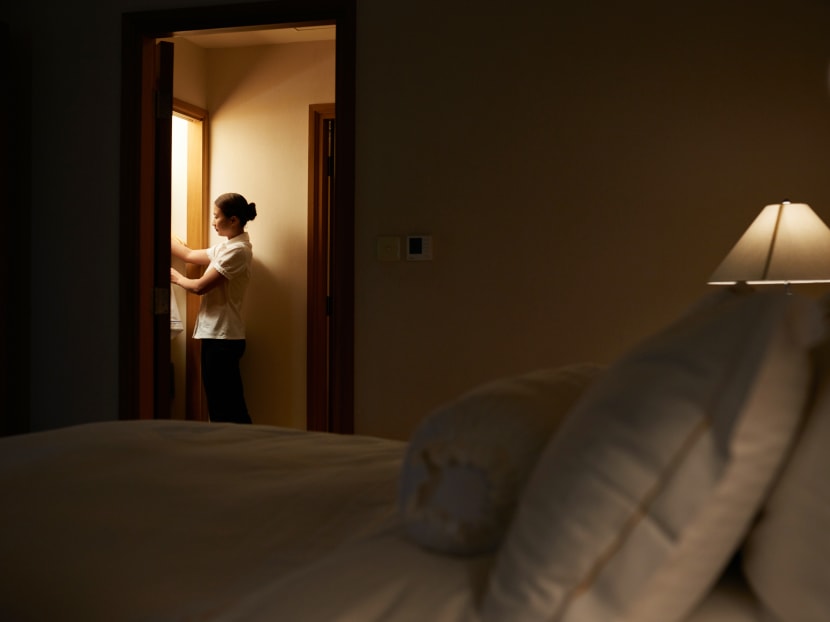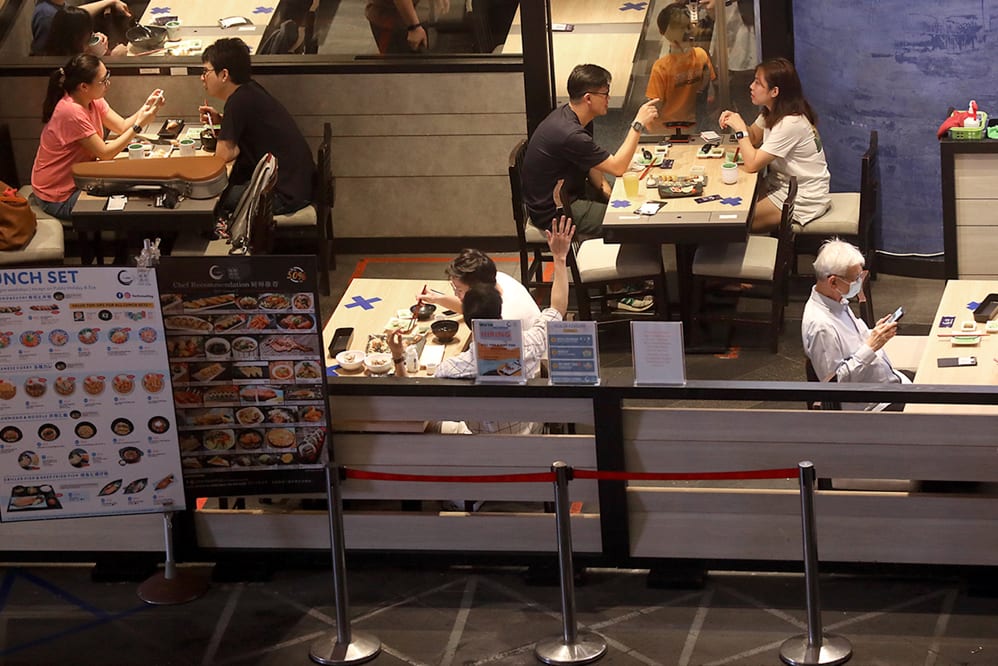The Big Read in short: Manpower woes drag down hotel, F&B service quality
Each week, TODAY’s long-running Big Read series delves into the trends and issues that matter. This week, we look at how hotels and restaurants are struggling to upkeep service quality amid a severe manpower crunch. This is a shortened version of the full feature.

A housekeeping staff member is seen in a hotel room. Industry players admit that they struggle to upkeep the quality of service as there simply aren't enough warm bodies.
Each week, TODAY’s long-running Big Read series delves into the trends and issues that matter. This week, we look at how hotels and restaurants are struggling to upkeep service quality amid a severe manpower crunch. This is a shortened version of the full feature, which can be found here.
- Since the pandemic started, border restrictions have worsened the longstanding manpower crunch in the hotel and F&B sectors
- Customers say they are experiencing a drop in service quality, even though they acknowledge the challenges faced by the businesses
- Industry players, too, admit that they struggle to upkeep the quality of service, as there simply aren't enough warm bodies.
- Some hotels and restaurants have tried to mitigate the impact by accelerating digitalisation and the adoption of technology but there are limitations
- Experts say that even if border restrictions ease in the coming months, any inflow of foreign labour that could ease the crunch will likely be gradual and intermittent
SINGAPORE — After forking out more than S$2,000 for a three-night staycation at Amara Sanctuary Resort Sentosa in November last year, Ms Wendy Chong and her family were told that their room was not ready when they arrived at the scheduled check-in time.
They were asked to wait at a restaurant that was a 10-minute walk away, where they were served only water.
“The counter staff weren’t apologetic,” said the 55-year-old assistant manager at a logistics firm, who was on staycation with her husband and two daughters, aged 12 and 16. “It didn’t bother them that they were checking us in later and it seemed like it happens very frequently.”
Their room was finally ready at about 5pm, close to two hours after her check-in time.
But when they entered their room, they found that the television and safe were not working, and the hotel’s technicians were unable to fix them.
“If you (the hotel) cannot cope with the amount of guests then don’t accept the bookings because you don’t have enough staff,” she told TODAY.
The Covid-19 pandemic, which has affected Singapore for two years and counting, has upended lives and livelihoods across the globe. In Singapore, the crisis has also severely disrupted the manpower supply in a country heavily dependent on imported labour in some industries — including in the labour intensive hotel and F&B sectors, which were already facing a manpower crunch before the pandemic struck.
As a result, customers say they are experiencing a drop in service quality, even though they acknowledge the challenges faced by the businesses. Industry players, too, admit that they struggle to upkeep the quality of service, as there simply aren't enough warm bodies.
“As much as we try to understand and empathise that they are understaffed, it does to a certain degree spoil the dining experience.Mr Lee ZJ, a 26-year-old customer”
Over at a steamboat and barbeque buffet restaurant in Toa Payoh, a customer, Mr Lee ZJ, noticed that servers seemed to be struggling to keep up with orders after it had to close its self-service buffet line to comply with Covid-19 regulations.
The servers had to take orders from customers and serve them to their tables personally, on top of clearing the tables, said Mr Lee, 26, a director at an automation firm.
Whenever he wanted to order food or get his water topped up, he would have to wait five minutes to get the attention of servers.
“As much as we try to understand and empathise that they are understaffed, it does to a certain degree spoil the dining experience,” Mr Lee said.
INDUSTRY CALLS FOR UNDERSTANDING
Industry players interviewed sought customers' understanding as they grapple with the labour deficit.
Mr Anuj Sharma, area director of operations for Singapore, Malaysia and Maldives at Marriott International, said that despite redeploying staff members from other departments within its hotels, its F&B, front office and housekeeping departments were stretched thin during peak periods.
“If not to a large degree, the shortage in manpower definitely had an impact on our overall luxury offerings and guests' experience,” said Mr Sharma. Marriott International manages several hotels in Singapore, including the JW Marriott Hotel South Beach, The St Regis Singapore and The Ritz-Carlton, Millenia Singapore.
An Amara Sanctuary Resort Sentosa spokesperson said in response to TODAY's queries on Ms Chong's experience that the resort constantly reviews its processes to ensure a "seamless and safe stay" for all its guests.
"We seek our guests’ understanding that while we try our best to provide the highest level of service possible, we acknowledge there may be instances where we fall short of expectations due to these challenges," the spokesperson said.
“While our industry is thankful for the local support, the high turnover of hotel rooms from staycations posed challenges for hotel operations, especially during peak seasons like festive or school holidays.Singapore Hotel Association executive director Margaret Heng”
Ms Margaret Heng, executive director of the Singapore Hotel Association, told TODAY that manpower challenges has been a prevalent issue for the hospitality sector long before the pandemic.
This partly stems from the Government’s efforts in recent years to reduce Singapore’s overall reliance on — or addiction to, as some say — low-cost foreign labour, by increasing the foreign worker levy and introducing measures to encourage industries to raise productivity. At the same time, getting more Singaporeans to work in the hospitality industry remains an uphill task since the work is associated with low pay and long hours.
The border restrictions amid the pandemic have only made it even harder for hotels to recruit foreign workers.
“While our industry is thankful for the local support, the high turnover of hotel rooms from staycations posed challenges for hotel operations, especially during peak seasons like festive or school holidays,” said Ms Heng.

The F&B industry — which relies heavily on labour from neighbouring countries such as Malaysia — also faces about a 20 to 30 per cent manpower gap, said a spokesperson for the Restaurant Association of Singapore.
“Of course, the longer waits in queues to get into the restaurant, and in some instances, a slightly longer wait at the table for the food to arrive has resulted in some customer service issues, but credit must be given to the majority of the diners who have been more patient and understanding,” said the spokesperson.
'STAFF STRETCHED THIN'
According to data from the Ministry of Manpower (MOM), the number of people employed here in the accommodation and F&B services fell by 24,600 to 247,100 between end-December 2019 and end-December 2020 amid the pandemic.
This was the first annual contraction in employment for the combined sector since at least 2009 when the national standard for classifying industries was updated.
MOM said in its labour market report for the second quarter of 2020 that accommodation and F&B services were among sectors hardest hit by the pandemic.
Latest MOM data showed that in the first three quarters of last year, employment in the accommodation and F&B services fell further by 7,500 to 239,600.
Hotels and F&B businesses told TODAY that the main reason for the worsening manpower crunch is because many of their foreign workers decided to return home and not renew their work permits, after having been unable to visit their families for two years.
“Housekeeping is the most challenging area, as we are finding it difficult to recruit locally for this position and have difficulty in recruiting foreign workers at the moment.Mr Brendan Daly, general manager for Yotel Singapore hotel at Orchard Road”
Mr Brendan Daly, general manager for Yotel Singapore hotel at Orchard Road, said that the hotel has vacancies in all of its operations departments including in housekeeping, front office, engineering as well as at its bar and restaurant Komyuniti.
“Housekeeping is the most challenging area, as we are finding it difficult to recruit locally for this position and have difficulty in recruiting foreign workers at the moment,” said Mr Daly, adding that wait staff for Komyuniti has been the second most challenging role to fill.
While the hotel has had busy periods where staff members were overwhelmed with work, Mr Daly said that it has been fortunate to have a group of long-term guests from Malaysia who require less frequent room servicing compared to short-term guests.
Mr Sharma, the director at Marriott International, said that the group’s hotels in Singapore often operate with many contract and part-time staff, who are usually from neighbouring countries.
With the travel restrictions, the group has had difficulty getting these workers back into Singapore. Its hotels’ housekeeping and F&B departments have been particularly hit, Mr Sharma said.
The group’s hotels have also been struggling to keep pace with the fast-changing Covid-19 rules on dining-in at restaurants, he added. He cited how during the circuit breaker in April to June 2020, its restaurants were operating with a skeleton crew.
When the rules changed to allow dine-in, it had to set up a new system that required much more manpower and it was "not the easiest task" to hire skilled service staff on short notice, he said.
And when buffets were reintroduced, the group could only offer one meal period a day before gradually increasing the number of timings as more manpower came on board, Mr Sharma said.
Buffets were allowed to resume in mid-2021 but servers must dish out the food items for diners, who are not allowed to help themselves to the food.
The restriction led to popular buffet restaurant chain Seoul Garden overhauling its business model in August last year and operating with an a la carte menu.
Now, it is facing another crisis after some foreign employees returned home, mainly to Malaysia, to visit their families when the Vaccinated Travel Lanes began opening up over the past months.
Seoul Garden Group now has about 160 employees across its 16 outlets, down from nearly 200 employees before the pandemic. Its chief development officer Garry Lam, 53, said the group currently has about 60 per cent of the manpower it needs.
“A lot of F&B players are facing the same issue, they can only depend on the local workforce. So what they can do is poach employees from other establishments,” he told TODAY.

ADAPTING TO THE CRUNCH
Before the pandemic, many hotels had already started to address the perennial manpower shortage through the use of technology. This has been greatly accelerated by Covid-19.
Ms Heng, the executive director of SHA, said that over the past two years, many of its 160 member hotels have embraced technology to offer contactless hospitality services, such as self-service check-in counters and robots that can deliver food to rooms.
At Marriott International’s hotels, the group has expanded the use of its mobile application which allows guests to bypass the front desk and access their rooms using their smartphones.
Ngee Ann Polytechnic senior tourism lecturer Michael Chiam said that hotels can train their staff from other departments to help out in housekeeping during peak periods while Mr Chew Kian Beng, who chairs the Temasek Polytechnic's diploma in hospitality and tourism management course, suggested that hotels work with schools to take in more students for work attachments.
Like their hotel counterparts, restaurant operators have also, over the past years, been adopting a variety of electronic systems to cope with the labour crunch, such as e-menus and pagers that buzz when orders are ready.
When the pandemic struck, Seoul Garden Group accelerated a digitalisation road map that it had, bringing forward some plans such as implementing a tablet ordering system and upgrading to smart kitchen appliances.
But some ideas that the group tried, such as having robot servers, did not work out that well. “They are not able to have any engagement or interaction with customers, which can be quite difficult or challenging, especially when our menu is quite big,” said Mr Lam.
THE ROAD AHEAD
Economists told TODAY that it is hard to predict when the manpower shortage in the hospitality and F&B sectors will ease, given that border restrictions were recently tightened again in response to the Omicron variant of Covid-19.
Labour economist Walter Theseira, an associate professor of economics at the Singapore University of Social Sciences, expects the manpower situation to get worse in the near term for these sectors, in terms of hiring locals even as overseas sources remain restricted.
“As the economy recovers, it will be easier for workers to get jobs in other sectors, which… tend to be more attractive because of better pay, career prospects, or prestige,” said Assoc Prof Theseira.
DBS senior economist Irvin Seah said that even if the global Covid-19 situation improves, it is likely that the Singapore Government will grant approvals to foreign workers in a gradual manner, instead of opening the floodgates.
This would mean customers having to get used to the quality of service they are experiencing now, unless — and until — hotels and restaurants rethink their operations and find ways to overcome the manpower crunch.











